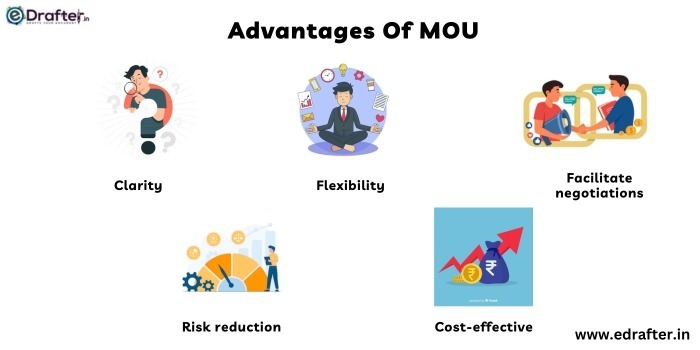Table Of Content
- Is MOU A Legal Document?
- What Is MOU In Business?
- What Is The Purpose Of Memorandum Of Understanding?
- What Is The Difference Between Memorandum Of Understanding And Agreement?
- Do I Need Any Document To Create A MOU?
- How To Create MOU Online?
- Can MOU Be Signed Online?
- What Are The Basic Rules Of MOU?
- What Are The Advantages Of MOU?
- Can MOU Be Challenged In Court?
- Is Registration Of MOU Compulsory?
- What Happens If MOU Is Broken?
- Is MOU Done On Stamp Paper?
MOU stands for Memorandum of Understanding. A MOU is an agreement between two or more parties for their mutual goals, responsibilities, and Understanding. MOU outshines the Terms, Conditions, and details of the cooperation or Collaboration. MOU is a non-binding agreement, It is the first step before creating a legally Binding Contract. It establishes a foundation for the parties to prevent misunderstandings by clarifying expectations and Responsibilities and bound the parties to work together.
Is MOU A Legal Document?
No, it is not since it is non-obligatory as it lists out the intent, purpose, conditions, and other matters involved in the relationship or collaboration between the contracting entities. Sometimes an MOU can carry some legal weight depending upon certain specific language used and the intention of the parties involved.
What Is MOU In Business?
In Business, a Memorandum of Understanding is a document that states the details of the partnership, terms and conditions, collaboration, and agreements between the two parties. MOU is commonly used in business like;
- joint ventures,
- Strategic alliances
- Mergers and acquisitions
- Partnerships etc
While MOU is not a Legally Binding document like a contract but it is still a valuable tool for clarifying responsibilities, simplifying roles and objectives between two parties.
What Is The Purpose Of Memorandum Of Understanding?
MOU serves as a blueprint, it is the main thing that unites the objectives, goals, and the scope of agreements. MOU is aimed at creating accountability and responsibility by exacting the roles, timeline, and responsibilities of each party, it thus, sets a level of commitment which both parties can agree upon, that in turn, encourages the parties to keep their promises and work towards the mutual goals that are stated in the document. The MOU means the purpose of which is multidimensional that is the state of the crucial role in various contexts from business to the international diplomacy. In the end, MOU helps to communicate, coordinate, and clarify the objectives of the parties involved to take off on a mutual try.
What Is The Difference Between Memorandum Of Understanding And Agreement?
| MOU These documents are usually deemed unbinding or less formal MOUs.Such documents express the aims, objectives and general conditions of a partnership between parties.MOUs are sometimes employed as preliminary papers to ratify a cooperative endeavor or negotiation process.In most cases, however, MOUs do not have any legal force even if they can illustrate the willingness of the parties to engage in negotiations or collaboration. | AGREEMENT Different from MOUs, agreements are binding in law.The specific terms can be found in them that states what is required and expected of the parties.Meanwhile, agreements have typically more content than MOU including: responsibilities assigned to each party, completion timeframes, payment modalities, method for resolving disputes as well as clauses on termination.When an agreement is signed by parties they become liable under its stipulations and specifications and if breached could expose the party at fault to legal action. |
Do I Need Any Document To Create A MOU?
It is not strictly necessary to have a specific document to make a Memorandum of Understanding (MOU), having a written agreement is highly recommended to have the common usage of the terms and to make the terms enforceable.
To create an MOU, you typically need:
- Parties Involved: You will have to determine who are the ones who will be signing the MOU.
- Terms and Conditions: This consists of the objectives, goals, the range of the work, the responsibilities of each party, the time frames, and any other important details.
- Mutual Agreement: The ceasefire is reached only if all parties involved accept the conditions mentioned in the MOU.
- Signatures: getting signatures from all parties can definitely facilitate the agreement and prove their dedication to the points mentioned in the MOU.
- The Legal Review (optional); One may find it to be a good idea to have the MOU reviewed by the legal counsel to see whether it is the right reflection of the intentions of the parties and is in accordance with the relevant laws and regulations.
How To Create MOU Online?
To create a Memorandum of Understanding (MOU) online, one needs to do the following :
- Step 1: Go to Our “edrafter.in” website and click on the “Request for Custom Documents” on the homepage.
- Step 2: Then redirect to the ‘Custom Drafting Page’.
- Step 3: Next, Fill out the form with all the necessary details such as Name, email address, phone number, and your requirements.
- Step 4: Review the details to make sure it accurately reflects your requirements.
- Step 5: Once you are satisfied with the details, then click on the “Proceed to Payment” button to pay for the service.
- Step 6: After payment, you will receive a draft of your Agreement in your mail for your approval and it will be processed once you have approved.
Ensure that all the interested parties are all on the same page about the terms of the MOU and if agreements are complex, it is better to have a legal expert.
Can MOU Be Signed Online?
- Electronic Signature Platforms: There are several electronic signature platforms available such as DocuSign, Adobe Sign, and HelloSign which facilitate the signing of documents like MOUs online.
- Legal Validity: Electronic signatures are recognized as being legally binding in many countries once particular parameters are met.
- Authentication: For instance, electronic signature platforms often use different ways to identify signatories such email verification, password protection or two-factor authentication thereby ensuring that both parties’ identity is genuine
- Tracking and Auditing: These platforms also offer features like tracking changes, time stamps and audit trails thus having a transparency record
- Global Accessibility: Online signing eliminates geographical barriers, allowing parties located anywhere in the world to sign MOUs without the need for physical presence.
- Efficiency and Convenience: It also allows for quicker turnaround times.
Therefore, signing MOUs online offers a convenient, efficient, and legally valid alternative to traditional paper-based signings.
What Are The Basic Rules Of MOU?
- Clarity: Clearly outline the intentions, and expectations of the parties.
- Mutual Agreement: All parties must voluntarily agree to the terms outlined.
- Non-binding Nature: Typically, MOUs are non-binding agreements, serving as a framework for future collaborations.
- Specificity: Define the scope and responsibilities of each party in clear terms.
- Duration: Specify the duration of the agreement or any termination clauses if applicable.
- Confidentiality: Address any confidentiality or non-disclosure provisions shared during the collaboration.
- Signatures: Though not always legally required, obtaining signatures from all parties adds legitimacy and mutual consent to the terms.
What Are The Advantages Of MOU?

- Clarity: A letter of intent clarifies the intentions and rules of the parties involved, reducing future misunderstandings.
- Flexibility: They provide a flexible framework that allows parties to adjust the terms.
- Facilitate negotiations: The letter of intent serves as a starting point for negotiations and helps both parties establish appropriate rules.
- Speed: Can write and sign quickly.
- Risk reduction: The MOU sets out responsibilities, thereby reducing the risk of future disagreements.
- Non-binding: A letter of intent allows parties to explore potential partnerships without entering into a formal contract.
- Build relationships: You can strengthen relationships between parties.
- Cost-effective: A letter of intent is typically less expensive and time-consuming to produce than a formal contract, making it ideal as a preliminary agreement.
Can MOU Be Challenged In Court?
Memorandums of Understanding (MOUs) are generally non-binding, but may be challenged in court in certain circumstances, particularly where one party believes the other party has breached a provision or there is a dispute over its interpretation. However, the enforceability of a letter of intent in court depends on a variety of factors, including the language used, the intent of the parties and whether a disagreement has arisen.
Is Registration Of MOU Compulsory?
Overall, there is usually no need to register a Memorandum of Understanding (MOU). However, the parties may prefer to register the contract to gain legal certainty or to create public evidence of their contract.
What Happens If MOU Is Broken?
If an MOU is violated, the consequences are determined by the agreement’s terms and the type of the breach. Although MOUs are usually not legally binding, a breach of the agreement could harm the trust between parties, lead to disputes, or even result in legal action if the breach goes against the law or other agreements. so other party can send a legal notice for breach of the agreement.
Is MOU Done On Stamp Paper?
Memoranda of Understanding (MOUs) are not always necessary to be on stamp paper since they are usually non-binding agreements. Nevertheless, in some countries or in some cases, the parties can opt to sign an MOU on stamp paper to give it legal value or to be evidentiary. The choice of using stamp paper is often determined by the local laws and the preferences of the parties that are involved. In cases where the MOU is based on significant obligations or financial implications, the use of stamp paper may bring an extra solidity and enforceability but it is not a must for all MOUs.


